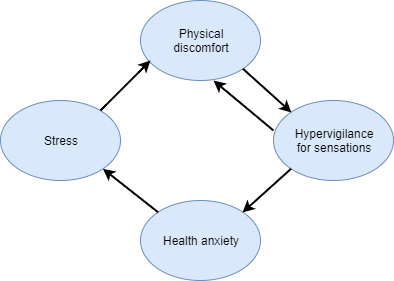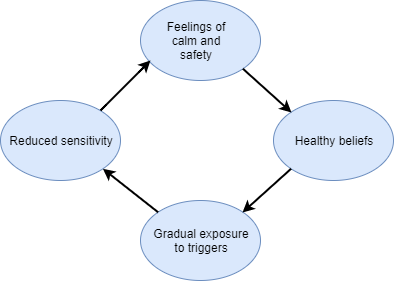Would you consider yourself rather sensitive to the environment you live in and its people? Have you started avoiding situations that cause you sensory overload, but still feel increasingly sensitive to even the smallest triggers? It often intuitively feels right to avoid situations that make us feel awful. However, especially with sensitivities, it isn’t always the best strategy for long term relief and in this article you will learn why.
According to research highly sensitive people are more likely to suffer from anxiety, depression and to have experienced negative childhood events. Trauma and a single or constant activation of the fight-flight or freeze response can lead to a heightened perception of the world. The purpose of this is to keep us safe in a dangerous world, by creating this hyper-awareness of our environment, so we are able to detect dangers and react to them. This survival mechanism is reinforced by normalized stresses of our modern world. Then loud sounds, smells and touch caused by our hectic environments can lead to our body’s fight-flight-freeze system being activated on a constant basis.
An over-activation and sensitivity can provoke auto-immune disorders, fibromyalgia, digestion issues, and other diffuse bodily symptoms. For example can extreme weather, cold, heat, foods or psychological stresses trigger episodes of diffuse pain in the body. The pain is an alarm that is set off, because of the body’s interpretation of rather normal stimuli as a threat. This can also lead to excessive worries about health and search in all the wrong places for a diagnosis to their health issues. People with more diffuse symptoms often have seen many health practitioners with none or several diagnoses. Developing an understanding and empathy for oneself and other sensitive people can offer great relief. But if one is not aware of this mechanism, a vicious cycle can develop:

Hypervigilance manifests in the body and in cognitions. We now know that vigilant beliefs play a crucial role in maintaining this cycle. If you for example belief that something is bad for you, then this belief alone amplifies the negative effects of a substance, situation or trigger. Let’s illustrate this with a food related example:
Sarah is sensitive to tomatoes which is based on her observation that she felt bad a handful of times after she ate certain amounts of tomato. So she has formed cognitions that serve to explain this and predict future events like: “. If I eat tomatoes I will have inflammation, stomach cramps and I feel horrible. Tomatoes are bad, they are nightshade plants which contain toxines (solanine). They should potentially not even be consumed by humans”. Every time she eats tomato she feels anxious of the negative effects especially when with other people. The immune system reacts to that stress, becomes more vigilant and ready to attack and expel the foreign substance. In that case the body responds for example with an allergic reaction, asthma or diarrhea.
The beliefs that Sarah holds emphasize the potential negative characteristics of tomatoes and serve to protect her from eating tomatoes and feeling horrible. However those cognitions also have the effect that if she ends up eating tomatoes she might feel more anxious, than without those beliefs. The negative expectation, anxiety and self-monitoring lead to a self-fulfilling prophecy and strengthening of beliefs.
Avoidance is a Slippery Slope
Avoidance plays a big part in maintaining unhealthy beliefs and bothersome emotions like anxiety. As human beings, we tend to move away or avoid that which causes us pain. But by avoiding what may harm us, by eliminating food or avoiding social or environmental stresses, we also eliminate the opportunity for healing or overcoming our fears. Avoidance, can also cause isolation and therefore feed into the vicious cycle of increasing anxiety, causing depression and worsening other issues. Consider this: If Sarah never eats tomatoes again her body will never learn that it might be safe to eat small amounts when she is in a relaxed mood. This way she would be able to decrease her overall sensitivity and meet friends for dinner more regularly.
How Hypnotherapy can Help
A big part of hypnotherapy is creating a setting in which you get in contact with your inner strengths and experience safety and calm. You can rehearse situations, feel in control and have positive experiences as if they actually happened. (Example: in hypnosis Sarah imagines eating a small amount tomatoes with no negative side effects, potentially even savoring the taste). Our subconscious can learn new behaviors and responses best when calm or in a hypnotic state. This even has the power to overwrite the body’s memory of old experiences: This encourages the growth of new neural connections (neuroplasticity) and creation of new neurons through hypnosis. Furthermore are targeted hypnotic suggestions effective in establishing healthy filters that help becoming more resilient and establishing alternative healthier beliefs. A holistic approach incorporates self-care and the slow and gradual exposure to triggers that can reduce any sensitivity and restore a good quality of life.




